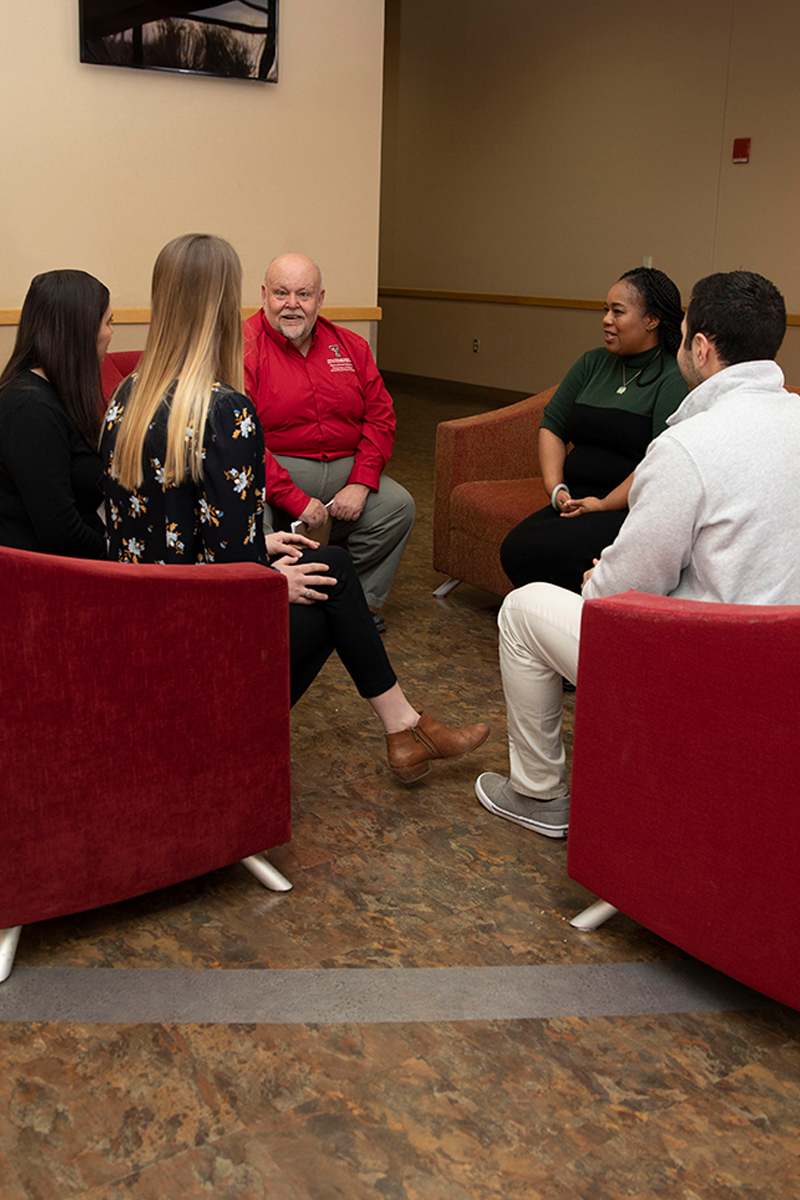Boosting Your Career With a Master of Science in Clinical Mental Health Counseling

Mental health counseling is a rewarding and fast-growing career. A Master of Science in Clinical Mental Health Counseling from Texas Tech University Health Sciences Center (TTUHSC) can help improve career prospects for many counselors and provide highly marketable and transferrable skills.
Professor Logan Winkelman, Program Director in Clinical Mental Health Counseling at TTUHSC explains that the requirements for mental health counseling jobs vary by state, and many typically require master’s degrees. Winkelman explains that there are many skills a mental health professional needs that the Master of Science in Clinical Mental Health Counseling can provide, including interpersonal skills, relationship management and collaboration. Winkelman also emphasizes that a master’s degree will help students to polish their communication skills, specifically their verbal and nonverbal communication which are both critical to being an effective counselor. “I think the skills that make a good counselor are highly marketable and transferrable across many different career fields,” states Winkelman.
Graduate programs also offer the chance for counselors to hone their critical thinking skills. TTUHSC’s master’s program helps students develop these skills by analyzing client cases, developing treatment plans, and navigating ethical dilemmas to gain real-world skills.
A unique aspect of TTUHSC’s mental health counseling program is that it is housed in a medical university, specifically the School of Health Professions. This gives students the unique opportunity to interact with other health professions and learn the different ways that each would approach patient situations and potentially contribute to solutions. “That’s unique to our program that someone that’s not with a healthcare focused program might not get,” adds Winkelman.
Quality Online Education
TTUHSC’s Master of Science in Clinical Mental Health Counseling is also one of the few fully online clinical mental health programs in Texas and in the U.S. “That’s something that really makes us stand out. You're getting the same quality education that you would in a face-to-face setting, but you're also getting these additional benefits. I believe that our program has many benefits not just because it's online, but because it's rigorous. It's part of a health sciences university,” states Winkelman. TTUHSC’s online counseling degree was designed for students who are working full-time. This uncommon approach allows students to work in their local area to complete the clinical requirements of the program and offers the flexibility to fit into busy schedules.
Winkelman also explains that the mental health department will soon be expanding beyond academics and opening its own clinic to provide counseling services, in person and through telehealth. Winkelman goes on to say, “A lot of times counseling faculty can get disconnected from the clinical aspect of counseling. Our faculty will stay in that realm where not only are we teaching it, we're also doing it.” At TTUHSC’s program, telehealth is an integral part of the curriculum. This growing emphasis on telemedicine will help prepare students to meet the unique needs of diverse communities and extend treatment access to underserved communities.
Setting Students Up for Success
As one of the few online clinical mental health counseling programs in Texas, TTUHSC also leads the way in setting students up for professional success through its clinical component. Students complete a 100-hour practicum and 600-hour internship, at the clinic of their choosing, where they have the chance to observe seasoned professionals and practice their own skills. This clinical experience allows students to take what they have learned in the classroom and apply it to patients in a real-world setting. Students who complete the program will then be eligible to sit for National Counselor Exam (NCE), which is one of the last steps to becoming a licensed mental health professional. Students are encouraged to understand the licensing requirements unique to the state they are seeking licensure.
Passing this exam and possessing a master’s degree in counseling opens up many professional opportunities. TTUHSC’s program gives students the experience and the tools needed to pursue licensure which may lead to director roles at mental health agencies or even open their own private practice. “We're committed to preparing our counselors to not only work competently but ethically through evidence-based counseling practices,” Winkelman proudly adds.
If you would like to learn more or apply to TTUHSC’s Master of Science in Clinical
Mental Health Counseling program, please visit the program page. You can also email the SHP Office of Admissions and Student Affairs at health.professions@ttuhsc.edu or call 806-743-3220 to learn more. ![]()
Related Stories
Celebrating Veterans: TTUHSC’s General Martin Clay’s Legacy of Service and Leadership
From his initial enlistment in the Army National Guard 36 years ago to his leadership in military and civilian health care management roles, Major General Martin Clay’s career has been shaped by adaptability, mission focus and service to others.
Texas Tech University Health Sciences Center School of Nursing Named Best Accelerated Bachelor of Science in Nursing Program in Texas
The TTUHSC School of Nursing Accelerated Bachelor of Science in Nursing (BSN) program has been ranked the No. 1 accelerated nursing program in Texas by RegisteredNursing.org.
TTUHSC Names New Regional Dean for the School of Nursing
Louise Rice, DNP, RN, has been named regional dean of the TTUHSC School of Nursing on the Amarillo campus.
Recent Stories
National Academy of Inventors Names TTUHSC Faculty Senior Members
The National Academy of Inventors (NAI) has designated two current and one former TTUHSC faculty researchers as Senior Members.
The John Wayne Cancer Foundation Surgical Oncology Fellowship Program at Texas Tech University Health Sciences Center Announced
TTUHSC is collaborating with the John Wayne Cancer Foundation and has established the Big Cure Endowment, which supports the university’s efforts to reduce cancer incidence and increase survivability of people in rural and underserved areas.
TTUHSC Receives $1 Million Gift from Amarillo National Bank to Expand and Enhance Pediatric Care in the Panhandle
TTUHSC School of Medicine leaders accepted a $1 million philanthropic gift from Amarillo National Bank on Tuesday (Feb. 10), marking a transformational investment in pediatric care for the Texas Panhandle.
